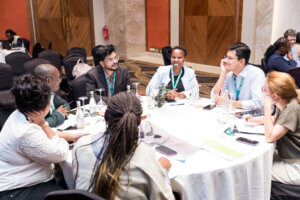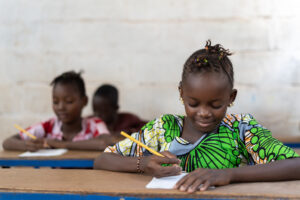Sabre Education is an international NGO which, since 2004, has provided children in Ghana with the best possible early childhood education by partnering with the government to implement play-based learning at scale. In 2022, Sabre Education was selected to be an Impact at Labs grantee and has spent the last year working with the Labs team to adapt and develop their successful public school kindergarten teacher training model for private kindergarten schools in Ghana.
In early 2023, Sabre Education commissioned a scoping study to examine the private sector’s provision of kindergarten (KG) education in Ghana and to inform Sabre’s work in the private schools sector going forward. This article captures some of the key findings surrounding the rise of private KGs in Ghana and outlines the scope for non-state organisations in early childhood education (ECE).
Background: Rise of privatisation in early childhood education globally
Non-state providers educate 41% of all pre-primary students across the world, compared to 14% and 19% at the primary and secondary levels, respectively. These statistics do not account for the large number of unofficial schooling markets operating in low-income countries (Baum, Cooper, et al., 2018) and the true extent of private school enrolment is likely to be higher.
Today, growth in private ECE globally has outstripped public enrolment (6% compared to 4%) and data suggests that 55% of all children enrolled in pre-primary education in low-income countries are served by private operators (UNESCO, 2015). However, there is limited government regulation of such operators, and quality varies greatly.
Low-fee private school (LFPS) are privately owned and administered by a local proprietor and/or principal, and they charge ‘low’ tuition fees. Schools are defined as ‘low fee’ if the fees charged represent between 10 and 50 percent of the total family income for the two lowest income quintiles in Ghana.
There are many reasons behind the rise of private ECE provision globally, including a limited supply of public pre-primary providers and increased demand due to parental perception of private education and quality education being synonymous. As the allocation of public funding and international aid towards early childhood development remains low, the role of the private sector in pre-primary education is expected to continue to increase.
Since 2008, Ghana has introduced two years of compulsory free public kindergarten education (2008), an ECE Policy (2020), a play-based kindergarten curriculum (2018-2019), and recently a national KG teacher training manual (2023). Access to ECE has improved significantly, however, the quality of that ECE is something that Ghana has recently turned its attention to addressing. Many teachers haven’t learned play-based pedagogy, transformed their classrooms into play-based learning environments, nor transitioned to positive behaviour management approaches: it’s this gap in quality that Sabre is partnering with government to address.
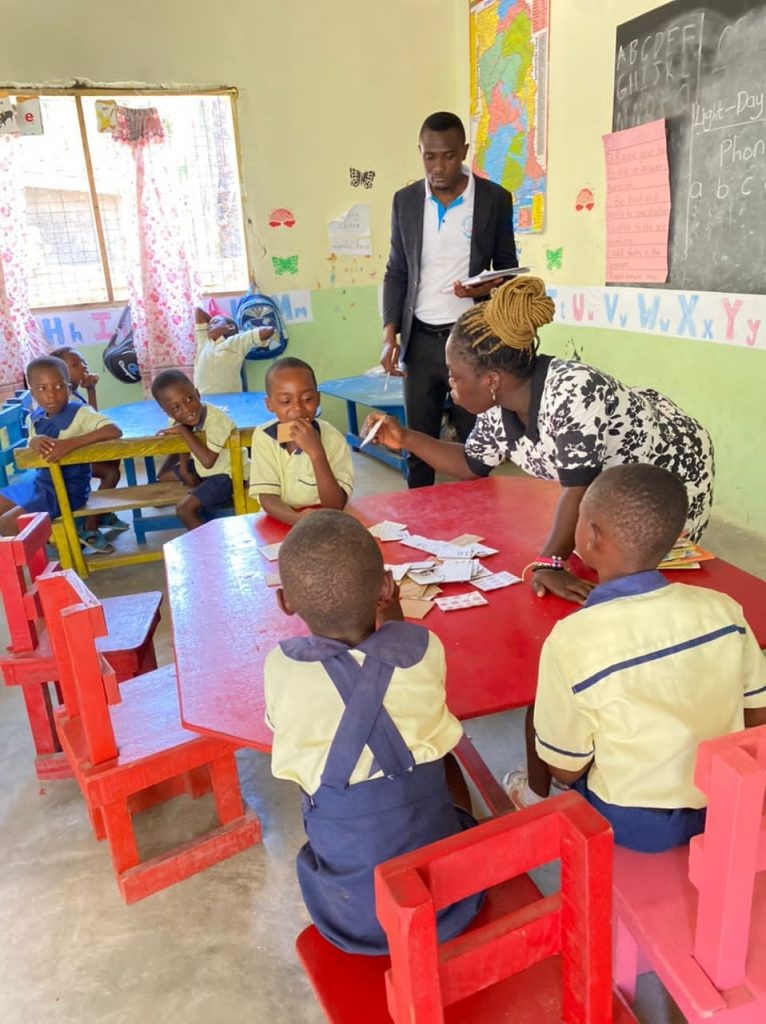
Scoping study: Findings and insights
Associates for Change completed the scoping study commissioned by Sabre on the education delivery and business model for low, medium fee and high private KG providers in Ghana. The objectives of the study were to: generate evidence to determine the market share of private schools; establish private schools’ level of awareness of the standard-based KG curriculum; and explore the market and drivers of private kindergarten schools, including the value parents place on them compared to public schools.
The data collection methods for this scoping study included key informant interviews and mini surveys. After a multi-stage approach in sampling, a total of 24 KG schools were studied across the low, medium, and high fee thresholds.
The study found that 44% of ECE providers in Ghana are private operators. This is particularly salient in urban areas where there are twice as many private KGs (8,398) compared to public KGs (4,040). Private provision of ECE can be divided into low-fee, medium-fee, and high-fee private schools, each of which provide drastically different learning and development experiences for their students.
- The challenge of untrained teachers in private KGs
In Ghana’s expanding private kindergarten sector, there is a noticeable gap in teacher training. Historically, Ghanaian ECE policies had not required ECE teachers to have a minimum set of teaching credentials. However, over the years, untrained teachers have been phased out of the public education system, and the private sector has been given a period of time by government to regularize their teaching force in compliance with this new direction in policy. As a result, public pre-school teachers are more likely to have higher levels of education than private teachers (Avornyo & Baker, 2018; Pesando et al., 2020) and are also more likely to be trained in ECD (0.72 versus 0.63) (Pesando et al., 2020). Some private school providers have voiced a desire for the government to expand opportunities for teachers in non-state schools to receive further training and professional development (Abdul-Hamid et al., 2015).
In particular, the scoping study commissioned by Sabre Education found that headteachers and educators in private KGs had limited teacher training. In rural KGs, 29.2% of teachers had only SSS/’O’ level/’A’ level qualification, and no teachers had a diploma or a higher degree in ECE. Similarly, in urban localities, 25.0% had SSS/’O’ level/’A’ level as their highest qualification and no teachers had a Cert A 3-Year, diploma or higher degree in ECE. Further professional training was required in foundational teaching areas. This included subjects like reading and math, but also extended to hands-on teaching techniques, such as play-based learning. While many teachers in these private schools believe they’re familiar with play-based learning and claim to use it, actual classroom assessments told a different story. These methods are rarely applied, pointing to a difference between what teachers perceive versus what happens in the classroom.
“We find it difficult to know what is going on by ourselves because we are not trained teachers” (Headteacher, School 6, Medium Fee Private School, Accra, Madina, La Nkwantanang, Urban)
– Sabre Education scoping study
The scoping study has helped to identify potential interventions for non-state civil society organisations. Sabre Education’s play-based teacher training and support model has already been tested and evidenced in public KG schools across the Central, Western and Eastern Regions of Ghana. Its model includes not only play-based teacher training, but also coaching by headteachers, monitoring, the provision of play-based classroom materials, and professional learning communities to ensure long-term support for public school KG teachers.
Sabre’s coaching has been instrumental in helping teachers to effectively implement play-based methods in their classrooms, and allowing headteachers to support their teachers more effectively, leading to improved teaching quality, and ultimately, better results for students. Now, Sabre is setting out to bring this successful teacher training model to the low-fee private school sector, and many private school providers are expressing strong interest. In particular, they would like the Ghana Education Service (GES) who is responsible for the administration and management of pre-tertiary education in Ghana, to focus on the private school sector as well as public schools.
“For GES l would like them to train private school teachers just as they train public school teachers. We all support the nation in its attempt to educate the children.” (Proprietor, Madina La Nkwantanang, Urban, Greater Accra)
– Sabre Education scoping study
The scoping study report conducted in 24 private schools showed that given the limited availability of many teachers, training should not be onerous, and should offer both online and offline options. Using the findings from the scoping study, Sabre Education developed three different training delivery models that have now been tested in 13 low-fee private schools in Ghana’s Central Region. Sabre has now distilled an appropriate model based on the learnings from the initial testing phase and are now embarking on a pilot implementation in 30 kindergarten schools using this model.
- The cost crisis
Many private schools, regardless of their commitment to quality education, have found themselves financially strapped and unable to afford Teacher Professional Development (TPD) services. A stark example of this was seen in Nanton, Northern Region, where not a single private school could bear the cost. UNESCO has found that many low-fee private schools remain limited in their resources despite parents spending 9.4% of their annual income to finance student education.
“We were asked to pay for (previous) training (by GES), but we could not afford it”
(Proprietor, School 1, Low Fee Private School, Northern, Nanton, Rural).
– Sabre Education scoping study
This financial strain had a cascading effect, leading to delays in producing essential teaching materials. A significant number of classrooms surveyed (60.71%) reported not having sufficient Teaching and Learning Materials (TLMs). The printing of teaching and learning resource guides and templates was often postponed, and in some instances, resources weren’t printed at all. Rural areas seemed to suffer the greatest from resource limitations, with the workbook-pupil ratio at 1:52, compared to 1:1 and 1:2 in urban and peri-urban areas respectively.
“We do not have enough infrastructure. We do not have enough TLMs too. We also need outdoor equipment for our KG learners.” (Headteacher, Nanton, Rural, Northern region)
– Sabre Education scoping study
Recognising this challenge, during the testing phase of its teacher training model in private schools, Sabre Education stepped in with an effective solution: cost-sharing. As a result of these private schools’ financial challenges, Sabre did not charge them for attending training sessions, however the schools needed to cover some costs including their teachers’ transportation This approach aimed to alleviate some financial burdens while still ensuring the schools’ participation and commitment.
- Addressing the shortcomings of teaching and learning materials in private KGs
Even with the provision of TLMs, these traditionally provided resources have come under scrutiny for their limited adequacy and appropriateness. Both headteachers and educators voiced concerns, emphasising the need to either purchase or develop TLMs better suited for the foundational grade levels.
“TLMs such as textbooks and others are needed to improve.” (Headteacher, Kumasi Metro. Ashanti region)
– Sabre Education scoping study
The scoping study found a particularly important gap within the existing material: the lack of interactive Teaching and Learning Resources (TLRs) that allow students to engage in self-directed learning. The current offerings seem to fall short of providing learners with the tools they need to explore topics independently. In response to this need, Sabre Education has been committed to supplying low-fee private schools with either digital or physical copies of essential materials such as templates. Sabre’s training also provides teachers with instructions to make their own no-cost or low-cost classroom materials. This approach further illustrates the vital role of non-state actors in intervening and providing solutions where they are most needed.
- Formal assessments still the norm in private KG classrooms
According to the private schools’ assessment report, while teachers and headteachers are aware of the importance of daily informal assessments of early child development, the emphasis in private schools remains predominantly on the traditional formal end-of-term exams – even at kindergarten level. Sabre Education has introduced assessment training as a component of their teacher training workshops with private providers. Moreover, they are actively working with school leaders to encourage a culture shift to ensure more holistic assessments are conducted in kindergartens by involving parents and caregivers in the engagement process.
New horizons and direction for change
The scoping study revealed that many private KGs grapple with subpar infrastructure, which is a fundamental requirement for the successful execution of methodologies like play-based learning. Many of the schools surveyed lacked seating spaces, furniture, and even toilets for the students in their KG classrooms. While organisations like Sabre Education might not have the resources to improve this infrastructure, they can, and do, champion the ECE cause in many ways. The voice of sector champions like Sabre carries weight in many policy discussions, as evidenced by the recent launch of Ghana’s national in-service kindergarten teacher training manual co-designed by Sabre. Advocacy wins such as these are vital in bringing about systemic change. By highlighting the existing gaps in the education sector and pushing for positive reforms towards play-based learning, Sabre plays a crucial role in shaping a more inclusive and successful educational landscape.
However, it is vital to acknowledge that sustainable education reform cannot be achieved by practitioners alone. To ensure that children have access to safe and quality education, there must be a strong collaborative effort between multiple stakeholders, including government, practitioners, communities, and researchers aimed at producing system-level transformation (Brookings 2022). System-level transformation can only be accomplished if various actors collaborate to uphold the education system to higher standards and accountability.
Related tool in the Scale Toolkit
Theory of Change
Competitive Analysis





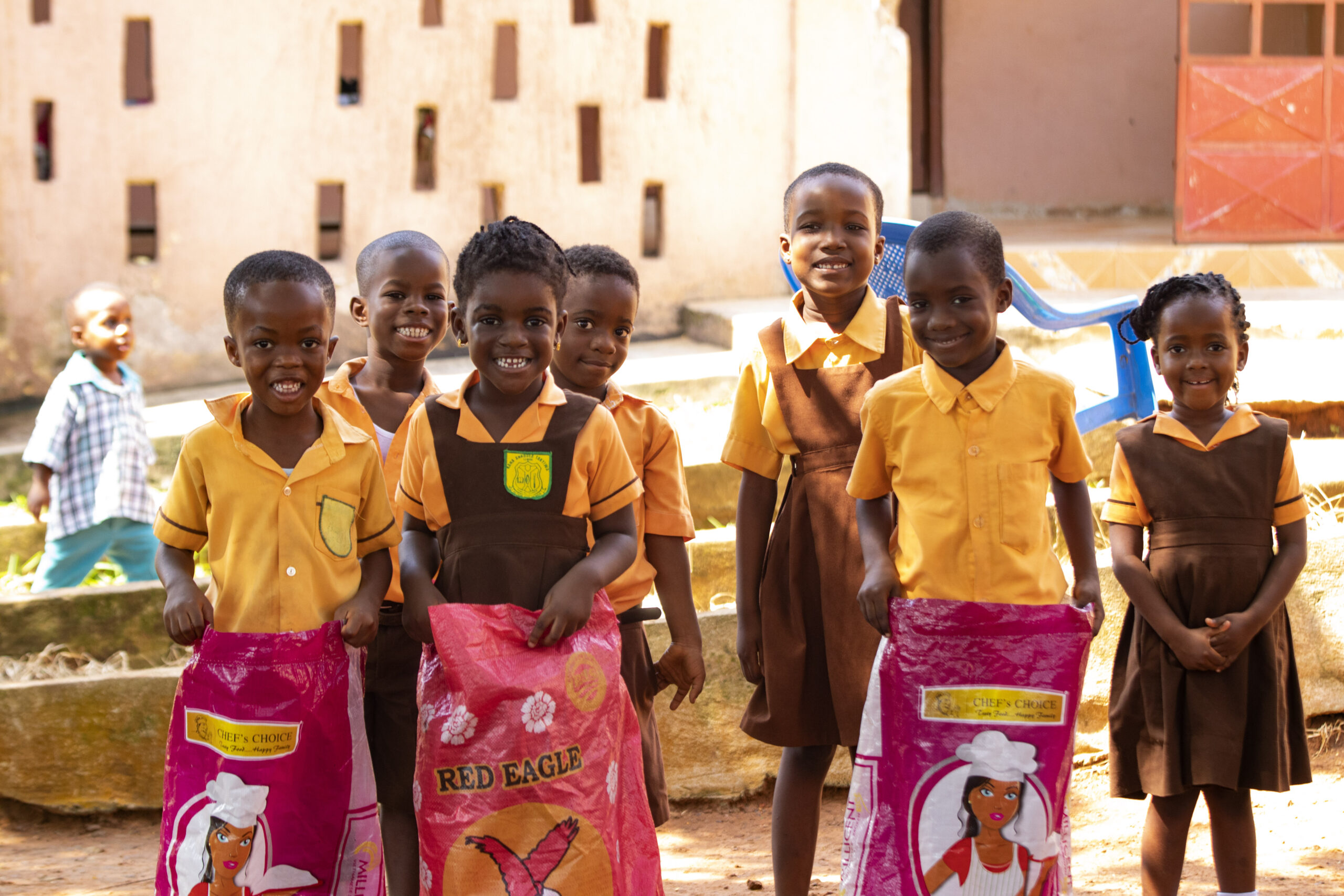




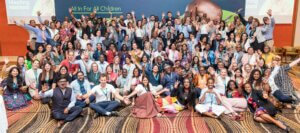
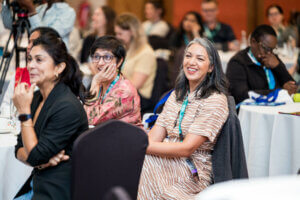
 Climate and Education
Climate and Education